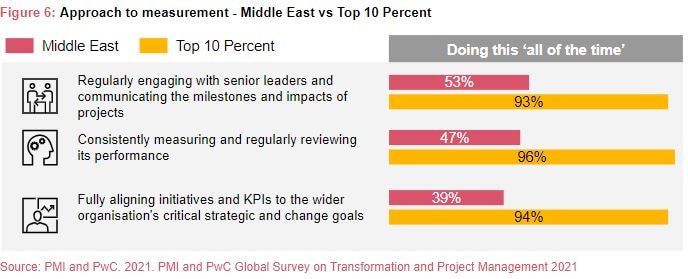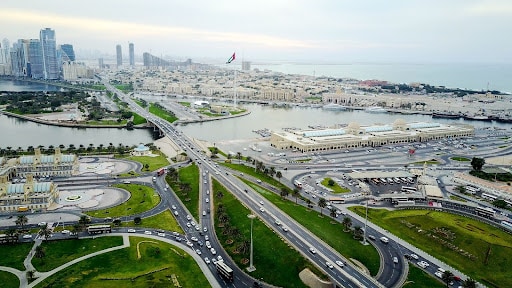What differentiates the top 10 percent project management offices globally?
Executive Summary
Large-scale projects are a key driver of economic growth in the Middle East. In recent years, some of the world’s most ambitious projects have been commissioned across the region, including the Riyadh Metro and Dubai 2020 Expo. As the Middle East’s transformation accelerates, organisations need to maximise efficiency in delivery, avoid project failure and prioritise projects that support their corporate strategy to gain a competitive advantage.
This report draws on the latest PwC and Project Management Institute’s (PMI) Global survey on Transformation and Project Management, conducted in July and August 2021, to identify the actions that will help Middle East project managers and leaders drive their organisation’s success. A total of 534 Middle East respondents with project management responsibilities took part in the survey, including 209 C-Suite level executives. Their answers provided an invaluable regional perspective on how project managers can navigate the Middle East’s unprecedented opportunities, as well as its challenges to ultimately drive the success of projects and transformations across the region.
PwC’s research with PMI has also identified a global cohort of 230 organisations with high performing project management offices (PMOs). C-Suite level executives in this “Top 10 Percent” group are more than twice as likely as their Middle East counterparts to say their organisation performed much better in 2020 compared with 2019 across a range of KPIs. These metrics include revenue growth, customer acquisition, customer satisfaction and ESG targets.
Our report explores what Middle East project managers and leaders can learn from the Top 10 Percent about improving their own performance, and we make the following recommendations:
Middle East organisations need to strengthen C-Suite support for the PMO to help move it beyond the execution of projects to driving corporate strategy
PMOs must tailor processes and methodologies to the different needs of the organisation and stakeholders to maximise their value
The current talent shortage requires organisations to build winning project management capabilities to avoid the risk of project failures, or alternatively to outsource PMOs
PMOs should use outcome-based measurements, engaging across the organisation to develop KPIs that will enable them to become strategic “Project influencers” and changemakers
PMOs need to implement digital upskilling at pace, supported by a cultural shift towards a digital mindset inside the PMO and the C-Suite
With hybrid working set to remain, project managers will need more support and training in managing teams remotely
In July and August 2021, PwC and PMI undertook a global survey of 4,069 people involved in leading or facilitating the delivery of projects, programs, and portfolios.
Turning the tide on the talent crisis
Currently, one of the greatest threats facing PMOs and the successful delivery of projects in the Middle East, is the shortage of talent and lack of investment in developing key project management skills, resulting in significant recruitment challenges. Compounding this, the profession appears to have something of an image problem, and although the perception is slightly better in the Middle East than elsewhere in the world, more needs to be done to help attract talent and reduce the skill gap.
Across the globe, project managers are viewed more as tactical troubleshooters rather than strategic partners, suggesting a widespread lack of understanding of the value and impact of project management. In the Middle East, 44% describe project managers as ‘schedulers’ and only a third say they are ‘essential’. A key attribute of the Project Influencer is being able to adapt and reevaluate in order to do things more efficiently. However, when describing project managers, only a quarter of respondents chose phrases like ‘flexible’, ‘creative’ and ‘realising visions’.
PwC’s ‘Who is the Modern Project Manager’ report, points out that project managers have evolved in response to the ever changing-environment they find themselves in. Their role is no longer focused solely on scope, schedule and budget. Rather, individuals are needed who can successfully influence the outcomes of projects through their strategic awareness and interpersonal skills, firmly focused on influencing outcomes, building relationships and achieving the strategic goals of their organisations. From the survey data (figure 3), we can see that organisations view these Project Influencer capabilities as being crucial to the successful delivery of project outcomes.
Figure 3: The capabilities gap: the top 5 capabilities of a project manager and the level of difficulty in recruiting
| Capability | % say this is a top capability of project managers (Middle East) |
% say capability is difficult to find when recruiting (Middle East) |
| Creative problem solving and innovative thinking | 34 | 40 |
| Knowledge of the business, industry and ecosystem, and their implications for projects | 28 | 27 |
| Understanding of the organisational strategy and its implications for projects | 26 | 35 |
| Ability to build trust and relationships | 26 | 31 |
| Ability to adapt use of tools, processes, methodologies and practices to different projects and teams | 24 | 26 |
Source: PMI and PwC. 2021. PMI and PwC Global Survey on Transformation and Project Management 2021
Rethinking measurement to improve the image of the PMO in the Middle East
The success of projects has traditionally been measured through the lens of the ‘Iron Triangle’, where cost, schedule, scope and quality are the defining metrics. Our research shows that this is still the case; in the Middle East, these four metrics are especially common. While these are clearly crucial when it comes to tracking project success, focusing on these factors alone is a missed opportunity. PwC and PMI’s Measuring What Matters report highlights that PMOs should not only adopt a greater breadth of measures, but they need to ensure they measure success consistently and regularly communicate key project milestones to the C-Suite. This allows PMOs to evidence the real change and success that their projects are bringing.
The Top 10 Percent have a strong strategic focus and support the organisation's performance management process, with 94% telling us they are constantly aligning initiatives and KPIs to the wider organisational strategy. Aligning KPIs to organisational strategy is key to making the PMO reporting function effective, providing maximum visibility of key metrics that senior leaders need to make timely, informed decisions.

Embracing technological change in the Middle East
The sudden upheaval brought about by the pandemic has only reminded us of the role technology plays in dealing with unprecedented change.
Organisations have had to be agile and resilient, in some cases shifting entire workforces online. Emerging from the pandemic, digital transformation will play a key role in allowing organisations to recover and grow. The 24th PwC CEO Survey points out that while this is particularly true in the Middle East - where 59% said they plan to significantly increase their investments in digital transformation - business leaders are concerned that cyber concerns and a lack of skills will threaten this transition. If the profession is to help its project managers grow into digitally enabled Project Influencers, then a significant investment in tech solutions and training will be essential. As our ‘Who is the Modern Project Manager’ report explains: this investment will not replace project managers, but rather, free them up to build relationships, influence outcomes and achieve the strategic goals of their organisation.
Our research shows that organisations in the Middle East, and elsewhere, are not fully taking advantage of technology, with a range of barriers making adoption difficult.
In the context of the pandemic, it is unsurprising that technology which has enabled remote working has been used most commonly to improve the management of projects.
As figure 7 shows, 83% of organisations in the Middle East say they have been using video conferencing platforms, while 72% (vs 61% globally) have been using mobile messaging applications. However, the use of more advanced technologies, like the internet of things (27%), artificial Intelligence (18%) or blockchain (10%), remain modest by comparison.

Navigating the pandemic and recovering quickly
As in the rest of the world, the pandemic forced the overwhelming majority (85%) of project managers in the Middle East to work remotely. While this inevitably caused widespread disruption to a multitude of business operations, those in the profession remained resilient, quickly adapting to new ways of working.
In fact, nearly two thirds say they have been more effective in their role since working from home. In response to the pandemic, 54% of PMOs in the region say they prioritised supporting the acceleration of new ways of working, while 48% say that planning for post-COVID recovery and a quick return to normal business operations was front of mind.

Tapping into the strategic value of the PMO
The project management office (PMO) has a vital role to play as the world transitions into a post-pandemic era and our research shows how PMOs can move beyond the tactical execution of projects and perform a wider range of activities that add strategic value. These evolved PMOs embrace new technology, are focused on team culture, and help develop project managers into ambassadors for value creation.
C-Suite support is vital for accelerating the development of a more strategic minded PMO. A key characteristic of the Top 10 Percent is close collaboration with the senior leadership, and this link is vital to help bridge the gap between strategic planning and the execution of projects.
The vast majority of the Top 10 Percent tell us that the C-Suite supports and values the PMO and considers it to be a strategic partner (Figure 2). Often this is through direct representation — 73% of the Top 10 Percent PMOs have a C-Suite-level role that represents the PMO, compared to 50% of organisations in the Middle East.
Figure 2: C-Suite support is a key feature of the most mature PMOs
| Global Top 10 Percent (n=230) | Middle East organisations (those working within PMO) n=370 | |
| Agree that the C-Suite understands and appreciates the value of the PMO | 94% | 74% |
| Agree that the C-Suite in their organisation considers the PMO to be a strategic partner | 94% | 70% |
| Agree that the C-Suite supports the PMO and demonstrates commitment to its success | 94% | 75% |
Source: PMI and PwC. 2021. PMI and PwC Global Survey on Transformation and Project Management 2021
Key lessons
C-suite support and flexibility are important factors
People lie at the heart of success
Identifying the right measures of success is key
A digital mindset needs to be adopted at pace
Adapting to new realities is necessary
Tracking your PMO’s level of maturity is crucial if you are to highlight its strengths and opportunities.
Our GCC PMO Maturity Index can assess your PMO’s current maturity levels across core competencies, benchmarking your organisation against its peers and quickly highlighting the best in class criteria. Register here for your complimentary report and exclusive access to the index.











